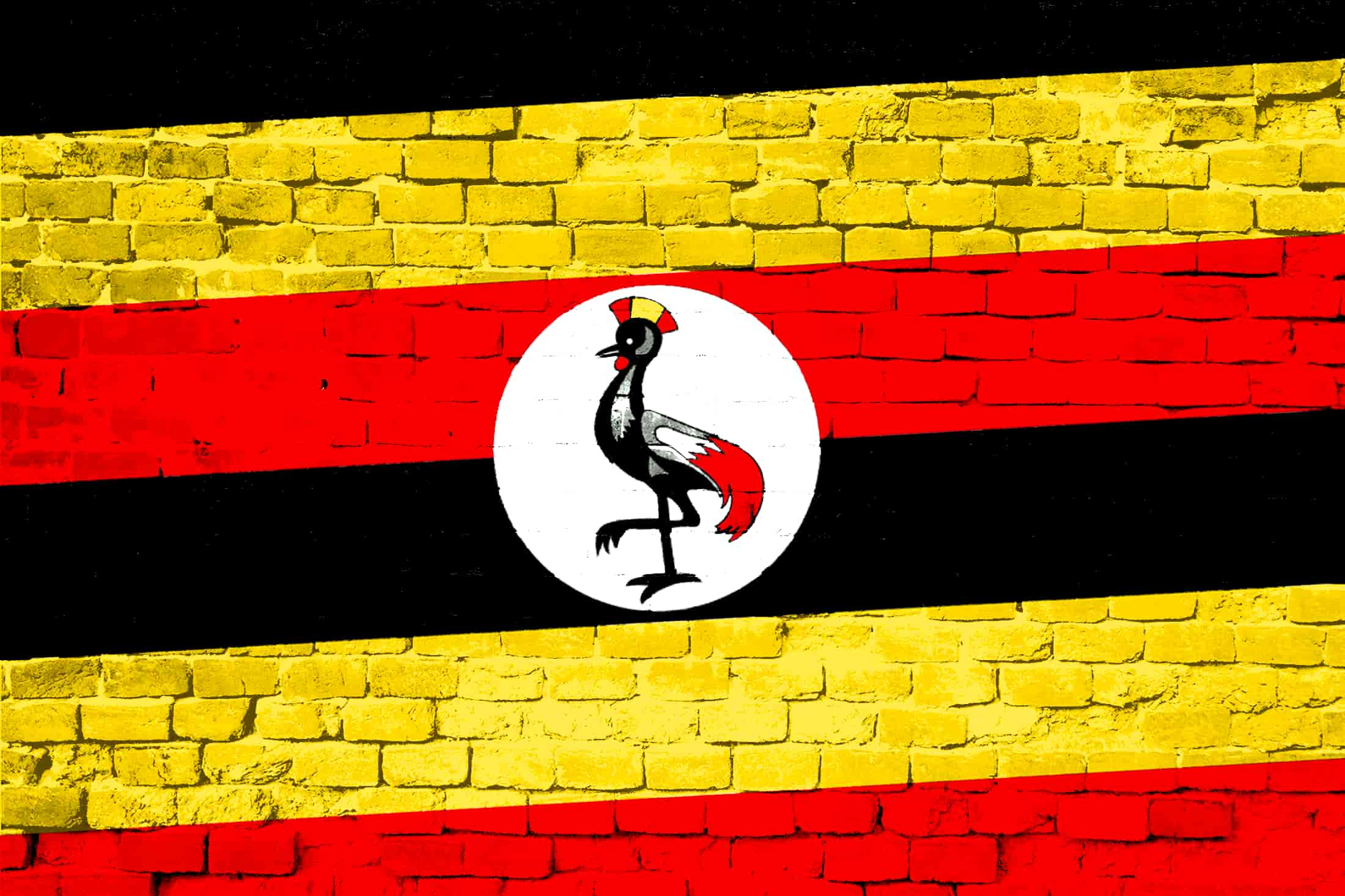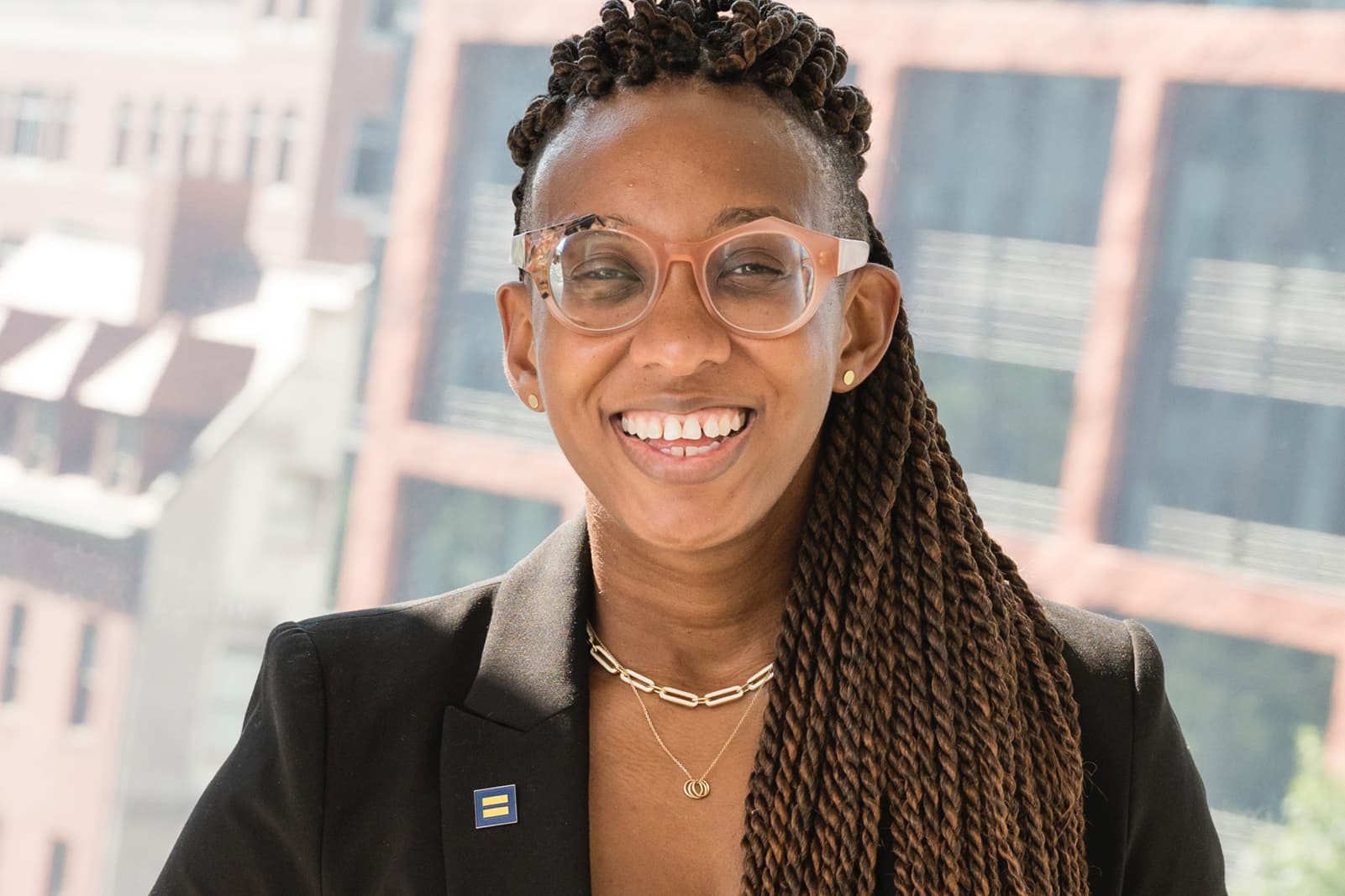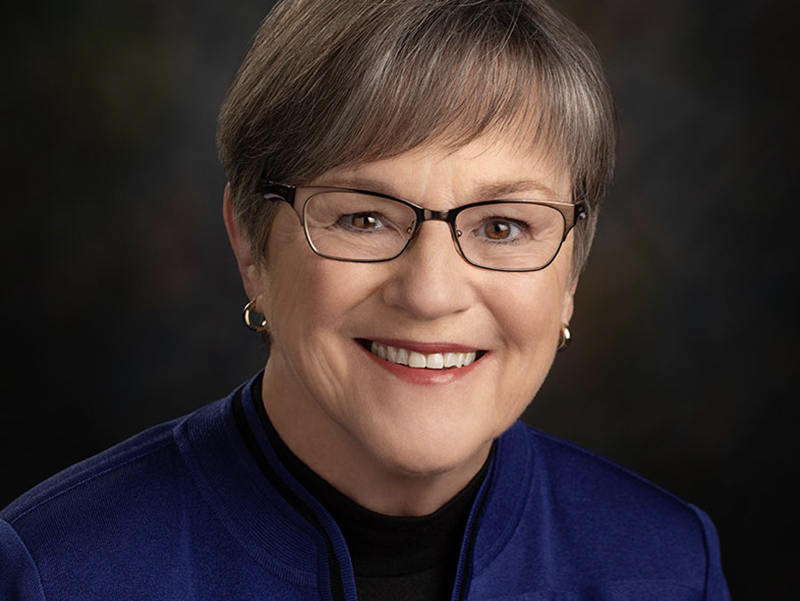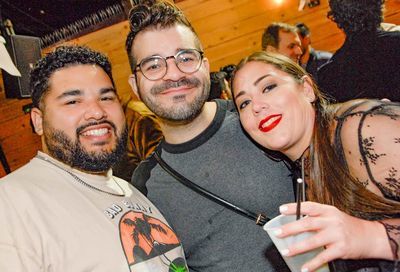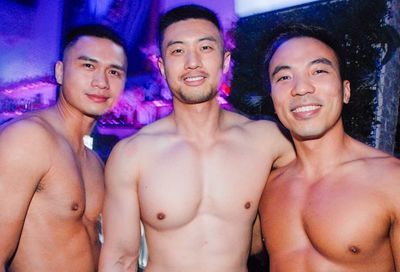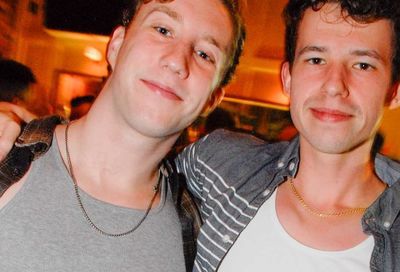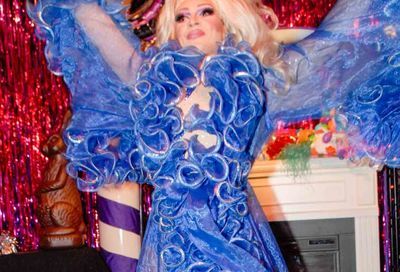The Promised Land
Kushaba Moses Mworeko left Uganda to seek asylum in America, but now he's living in limbo
Ugandan politics took a sad walk onto the world stage at the end of 2009, when David Bahati, a member of Parliament, introduced a bill to gruesomely enhance his country’s existing laws against gay people – making it a crime not to report gays, and going so far as to call for the execution of gays in some circumstances. The death penalty provisions have not become law, but Uganda remains hostile territory.
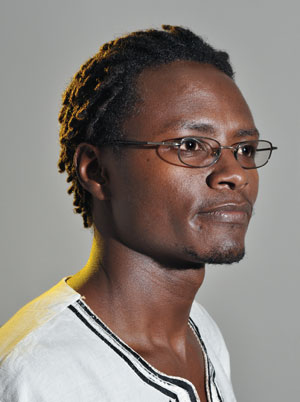
Kushaba Moses Mworeko
(Photo by Todd Franson)
Kushaba Moses Mworeko, a 31-year-old Ugandan, knows that firsthand. In October 2009, the same month Bahati introduced his bill, Mworeko, who usually goes by Moses, made his first trip to the United States. While the official purpose of his trip was to participate in an HIV/AIDS conference on South Padre Island, Texas, Mworeko already had hopes of finding a U.S. port to shelter him from the homophobic storm back in Uganda.
”You are subjected to police arrests and torture, and sometimes these people die in jail,” Mworeko says of the situation for gays in Uganda. ”Unexpected house searches sometimes lead to bribes to protect oneself from being exposed by the media.”
Mworeko’s visa expired in November, but he has remained. From Texas, he came to D.C., where he participated in a press conference organized by the Human Rights Campaign, Truth Wins Out and others to oppose February’s National Prayer Breakfast. Organizers of that annual breakfast, ”The Fellowship” (aka ”The Family”), are reported to have ties to Bahati and other homophobic elements in Uganda. Bahati was even initially invited to the breakfast. That conference and other efforts helped draw attention to the plight of gays in Uganda, leading President Obama to use the breakfast as a platform to criticize Bahati’s bill as odious.
While the furor over Bahati’s bill has died down, Uganda remains one of the world’s most inhospitable countries for gays and lesbians. But it’s not alien. Actually, it’s much like America of just a few decades ago.
”Americans struggled with gay rights for a long time,” Mworeko points out. ”I know it was very hard at the beginning. The way it was very hard for Americans at the beginning, it is very hard, very difficult for Ugandans, and Africans in general.”
What is very different, however, is that when American gays of the mid 20th century were taking their first swipes at oppression, there were not other countries recognizing gays as an oppressed minority and offering them asylum. Today, America is one of those countries that does. Whether or not it will offer safe haven to Mworeko remains to be seen.
METRO WEEKLY: How long have you been in Washington?
KUSHABA MOSES MWOREKO: My birthday was the first day I was here in D.C., Feb. 1.
MW: Was that a good birthday present?
MWOREKO: Yeah, I think it was. [Laughs.]
MW: I know you came from Uganda, but is that where you were born?
MWOREKO: Yes. I’m from a district called Bushenyi in the southwestern part of Uganda. The village is Kagonge. I lived there until I was 20. I did not live in the village where I was born, but I went to boarding school in the district. I went when I was 7. All my life I was in boarding school.
MW: What was your childhood like?
MWOREKO: My childhood was good. I was from a well-to-do family. My dad used to live in town, in Ishaka, and I would stay with my dad. It was fun, although at times I used to miss the country life. Cows, gardening….
MW: And your relationship with your parents?
MWOREKO: My parents passed. My dad died when I was finishing elementary school. My mom died when I was 15, in junior school.
MW: They were victims of the AIDS pandemic?
MWOREKO: Yeah. And I have two brothers and three sisters. I am the firstborn.
MW: So you became –
MWOREKO: The head of the family. The others were between 9 and 14. The oldest were responsible for the house, for working. The others were just kids.
My dad was rich. He had some businesses in town. When he died, everything shut down. Everything stopped. My mom was a housewife and she lived in the village.
I made sure that when it was time for holidays, we would all go back to our house and do gardening, prepare crops. Other times, everyone would be at school.
MW: For a 15-year-old boy, the challenges of raising your family must have been overwhelming.
MWOREKO: Definitely. I didn’t see myself as head of the family. ”Moses, what do we do?” ”Moses, what about fees?” And I had to look for people to take care of the kids when I was not there. Whenever it was time to go back to school, I would send them to those uncles who would help them during school time. When they would come back for holidays, we would be in our house, just alone.
MW: Was this also the time you began to think you might be gay?
MWOREKO: Actually, even before my parents died, they knew I was gay. It was known at my elementary school.
At first, people could tell because of my behavior. Then, at school, with the boys I used to live with in the dormitory, there was a guy. We came from the same village, we went to the same school, we were studying in the same class and sitting at the same table. There was attraction between us. We started having sex, and that spread in the boys’ dormitory.
MW: News that you were having sex spread?
MWOREKO: No, the kids started having sex. We were young. It was experimental. Of course, I definitely had those feelings. All that spread through the dormitory of like 40 people.
What happened, I think, is that one of the boys did not like it and was forced to do it. There was a conflict between him and the one who was imposing it on him. They fought, and that’s when the news came out and the teachers found out. They said, ”Okay, who has done it?” We were all rounded together and beaten, punished. Because it started with me and my friend, it all came to us. They had to send for our parents and it was nasty.
My dad was furious. Of course, he had to punch me before the teachers. Then when I went home for the holidays, they had to beat me. I mean, the firstborn – ”You are shaming us. This can’t happen to us, to our family.”
After my parents passed, during high school, I was free. Although, in my high school I was being helped by my guardian, an Anglican priest, who decided to help me with my education. I remained in the closet because of that.
MW: Did you meet this man through church?
MWOREKO: He was a friend of my dad. They went to school together. He was a family friend.
I went to university after high school, but I waited for like three years because I didn’t have the money for university. I did a lot of work to take care of my siblings. I taught at a junior high school. Then I worked in a taxi. Then I learned how do to do hairdressing.
MW: Here, the cliché is that if a man is a hairdresser, he’s probably gay. Was that the perception in Uganda?
MWOREKO: Yeah, that’s how they thought of it. I was braiding hair. That is a ”woman’s job.” But they liked my service. I enjoyed it, but I didn’t want to keep doing it.
I still had my dream of going out to help people who are so disadvantaged. I really wanted to go to university and get the resources, that body of knowledge, I needed to help.
MW: And when you eventually got to university, what was the environment like?
MWOREKO: I started in 2002, studying social work and social administration at Uganda Christian University in Mukono, 20 miles from Kampala. The person paying my fees was my guardian, the priest. And this was a Christian university, so my social life wasn’t all that.
When I started university, the Internet wasn’t there – just a few people accessed it. But toward the end, by graduation, the Internet had come. We had [gay] websites to go to. The Internet exposed me more to this. That was 2004, 2005.
MW: Was there anything like gay bars in Kampala?
MWOREKO: No. Absolutely not. Even if gay people went somewhere, you would not tell, you would not know. But I met some gay people through the Internet. I got in touch with people who started the gay websites, other Ugandans.
MW: It was an e-mail with one of those friends that put you in jeopardy?
MWOREKO: Yes. That was when I was already working. After I graduated, I was given a job at that very university. I was teaching. And my guardian’s office was in that university. He was the director of a church program: Theological Education by Extension.
That’s the time I had the freedom to do whatever I wanted. I lived in my own house. I was free. I felt like I could do whatever I wanted to do.
MW: Did you have any reason to think your guardian might have suspected you of being gay?
MWOREKO: No. People would comment on my behavior, my lifestyle, and it would just stop at that.
But this one day, I was in his office accessing the Internet. I was communicating with my boyfriend. My guardian called for me abruptly while I was in his secretary’s office. I knew I was coming right back, but as soon as I went to his office, the secretary came in. She read my mail. When I came back, she said, ”Moses, were you the one on my computer?” I said yes.
”What’s this?” she asked.
”What?”
”What’s this?”
”Well, what do you think it is? And what’s the problem?”
MW: This secretary, did you know her very well?
MWOREKO: I did. She had worked for my guardian for many years. She was my friend. I was part of that group who worked in that office. But when she saw this, it ended with her intimidating me and threatening to report me to my guardian. Of course, she knew the consequences if she reported me to my guardian or to the school officials.
By then, I was also a student. After I’d earned my bachelor’s degree, I decided to enroll for my master’s in public health. So I was teaching and a student at the same time.
The rules and regulations were so clear about homosexuality. The moment they get you, you are expelled from school. If you are an administrator or staff, then your services are terminated.
MW: Would they inform they police?
MWOREKO: No, they would just expel you. Just get rid of you.
MW: Did she tell your guardian?
MWOREKO: She did not tell my guardian, but she did tell the dean of students. I happened to go to junior school with the dean of students. She knew who I was. We used to talk and joke. She called me to her office and she said, ”Moses, you have a problem.”
”What problem?”
”No, you have a problem.”
”No, I don’t have any problem.”
MW: When she called you to her office, did you know it was for the accusation that you were gay?
MWOREKO: No, I did not know. I thought it was for our usual conversations we would have. But with her tone, the way she spoke, I thought, ”This must be something different.” All of a sudden, of course, my mind went to that. Then she said, ”You need to confess and we have to have some counseling for you.”
I said, ”I have nothing to confess, and I don’t need any counseling because I don’t have any problem.”
MW: Were you frightened?
MWOREKO: Definitely. I was thinking of my job, my career. If I’m expelled, what next? It was going to be catastrophic.
So I said I didn’t know anything. She said that if I didn’t confess to her so that she could put me on counseling, then she would report me to the administration. I think she was trying to put herself in a better position: If she didn’t confront me to confess and the school administration knew about it before she reported it, then she would be in trouble. But I denied everything.
In the time since graduation, even before that, my guardians and aunties had started telling me, ”You have to get married, because you are the firstborn and you need to bring a wife who is going to be at home in the village.” So when all this was going on – reporting me to the administration – then the marriage issue also came in. It helped. I went to my guardian and I said, ”Okay, I think I need to get married.”
MW: But to whom?
MWOREKO: I had never seen her, but my guardian knew her dad. They went to school together in Kenya. He’s also an Anglican priest. They organized it.
I saw the girl for the first time, and we talked. She was ready for marriage. My guardian called her and told her she would have a great responsibility if we got married: ”Moses is the head of that family and you will need to take care of those people.” She said, ”Fine, I have no problem with that.”
MW: How long did all of this take?
MWOREKO: It was just a short period of time. Everything was just happening – boom, boom, boom. [The dean] took about two months to report me. It was in bits, in just half a year. When the administration called me, I said I was not gay. The dean of students was given the task of following up the case. Then it was the counseling department. I kept reporting to those people, so there was no way they could terminate my contract, because they had no proof. I expected her to submit [the e-mail] proof, but she did not. When it came out that I was to get married, I think she was like, ”No, let’s not….”
MW: And you got married?
MWOREKO: I did.
MW: Were you hoping that the marriage would make all your problems disappear?
MWOREKO: No. I absolutely did not have that in mind. Actually, my boyfriend told me, ”Moses, you cannot get married.”
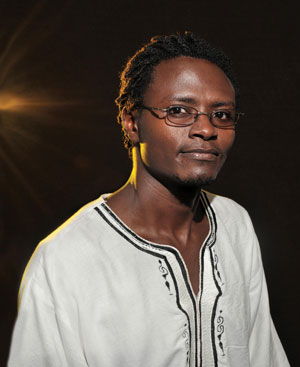
Mworeko
(Photo by Todd Franson)
I said, ”Well, I am going to get married because of these reasons: I want my job, I want to continue studying, this pressure from my family, my students no longer respect me. I can’t keep on like this. I don’t want to die now. I need to have a stable mind. I need to do this.” So I went ahead and got married.
MW: Was your boyfriend furious?
MWOREKO: He wasn’t furious, because he knew what was going on.
MW: How was married life?
MWOREKO: We did not have sex. There was no arousal.
MW: Did your wife know what was happening?
MWOREKO: Before we got married, there was the church counseling. The priest said, ”You don’t have to have sex the first night or the second night. At times you are nervous. You don’t know each other. When things don’t work out, that’s okay.”
I knew what was going on, but I said, ”Okay, the priest told us this.” She had the hope that maybe things would work out. Unfortunately, things did not work out. I had to ask her, ”What do we do?” She had no idea.
I came up with a suggestion. I told my boyfriend. He was a medical doctor. I told him about it and he said, ”Okay, both of you can contact me. If she is willing to accept you taking medication for arousal, fine.” We had a phone conversation with him, the three of us, and we agreed on that.
MW: This doctor was your boyfriend, and your wife didn’t know?
MWOREKO: She had no idea. But he worked in a good, international hospital. We’d gone there before our marriage for our HIV testing, but she had no idea who this person was.
MW: Did this situation hurt your boyfriend?
MWOREKO: He was hurt. But we got the medication and I used it and I was able to have sex with her. She was happy with me and got pregnant. We had a baby. He turned 2 years on the 16th of June.
But we never lived together. [My wife and I] worked in different places, about 200 miles apart, and it was too expensive to commute. And my son was born when I was not there. I was working in Iraq.
MW: What were you doing in Iraq?
MWOREKO: I went to work for the U.S. Army. The job was ”security specialist.” I took that on because, first of all, I wanted to get out of the country. I was so tired of the job at the university and all that was going on. I needed a break. I was no longer concentrating on my studies. I was so depressed. I just wanted to leave.
MW: So Iraq was your vacation?
MWOREKO: Iraq was my vacation. [Laughs.] I went to Iraq just to relax, and it helped me. After six months, I went back to Uganda and I got the job with the AIDS organization.
MW: And that’s the job that brought you to America. What happened once you got here?
MWOREKO: When I came, I had in mind that I wasn’t going back because of what was going on in Uganda. I have already told people, going to jail in Uganda for just one night, one would rather spend his whole life in jail here.
I did not know any person here. Well, there were people I knew, had been in touch with, just friends. But I did not rely on them. I was going to Texas and they were in New York and Tennessee. I did not have a person to go to and say, ”Okay, I’m here. I need this.”
So when I was in Texas, I looked for organizations that would help me. I came across Other Sheep. It’s part of the [Metropolitan Community Church]. I contacted the executive director and he responded positively. He lives in New York, but they have an Africa coordinator in Texas. He connected me to that person, who is from Kenya. He also got asylum here. We got in touch with him and I had to travel after the conference from South Padre Island to Dallas. In Dallas, I went to an organization called Human Rights Initiative (HRI). They referred me to Immigration Equality.
He helped me get in touch with some other organizations that could help me, because I was not mentally well at the time. I had some problems. I had nightmares, all that. He took me to the Center for Survivors of Torture and I went through some counseling. I met a doctor there and he gave me some drugs. I still use those drugs. They help me.
I don’t know how HRC and Truth Wins Out found out that there was a gay person in Texas who was trying to seek asylum, but they organized the press conference during that time that The Family was going to have its National Prayer Breakfast. HRC and Truth Wins Out, they contacted me. They took all the expense of bringing me up here so I could speak, and that’s how I ended up in D.C. After that, of course, they had paid for my return to Dallas, but I felt being in D.C. helped me. I met some people and they proved to be in positions to help me. I would have more opportunities here than in Dallas. That’s how I ended up staying.
MW: At the time, the proposed ”kill the gays” bill in Uganda was big news here. How was it being debated back in Uganda?
MWOREKO: Gay issues making headlines started in 1997. That’s when the media started saying, ”We need to expose these people that are shaming us, shaming the community,” and put names in the newspapers. They would put your name, the organization you were working with. They would put where you live. The moment they put the organization, you are fired. When people know where you live, they chase you. It was crazy. That’s when things started becoming so bad.
MW: Although President Museveni has been saying awful things about gay people for years, the climate today seems even worse.
MWOREKO: The ”ex-gay” people and ”The Family” have gone to Uganda and they have said there is therapy for gays, meaning you can ”cure” that. And the Ugandan church believes them.
But it was already there – it just helped turn the stone. A straight, indigenous person full of this Africanism says, ”Well, these people are coming to help us because this is a disease. And it’s a white-man’s disease. So if a white man comes to help us get rid of it, then it is fine.”
In the ’80s, in the ’90s, no one talked about this. It’s not there, never exists. No one is looking for you. But because the president used to come here, travel around the world, hear gay people demonstrating for equal rights, he would come home and use them as examples: ”Can you imagine people, instead of fighting for education, they are just talking about homosexuality?” In ’96, ’97, many gay Ugandans started knowing each other, coming to groups, having parties, meeting. That’s when things started coming out and the media started talking about it and it caught people’s attention. ”What’s this? What’s happening?”
Africans, in general, have their own culture. It is just an African way of life, of looking at things. It is family. My grandparents gave birth to 13 children. My uncle, he has four women and I don’t even know the number of children. Everything is centered on family, family, family, children, children, children. I can give you an example: If I married and we had only girls, my family would advise me – not to divorce – to get another wife so that I can have a boy. That boy is looked at as a person who will continue the family. If you are gay, not having any kids, what is going to happen to you? When you die, you are dead. What happens to the family? It’s dead.
MW: Where does your request for asylum stand?
MWOREKO: On the 16th of June in Alexandria, that’s when I had the interview with the asylum officer. On the 29th of June I went back for the results. I went to the counter and she said, ”Sign here.” I said, ”What is it?” She said, ”Well, the officer did not grant you asylum. You are signing that you are going to appeal.” I asked what could be the reason. Of course, they were stated. One was like, ”material inconsistencies,” then ”lack of details.” And then, ”material implausabilities with regard to country conditions.” I signed the paper and I asked her about the material implausabilities, the conditions in the country. That’s when she said that maybe things aren’t bad in Uganda. But then she said, ”We have not denied you asylum. You still have the court to go to. You can still appeal.”
There were other people there receiving the same news – no, no, no, no…. Because of what I have gone through in life, I know how to take care of myself in certain situations. That’s it for now. I accept the charges against me, that I am an alien and I am here illegally, all that stuff. And I will put my case before the judge why I am here illegally, why I decided to stay, and then we’ll request an appeal.
MW: In the meantime, Bishop Rainey Cheeks is housing you?
MWOREKO: Yes. I became friends with Rainey Cheeks the first day I came to D.C., even before the press conference. Some friends of mine organized a talk for me about what was going on in Uganda and that’s how we met. When I went back [to Dallas for my belongings], he’s the one who brought me back.
MW: So now Bishop Cheeks is your guardian?
MWOREKO: Yes, he is my guardian.
MW: You have a history of strong religious people in your life.
MWOREKO: And I am religious.
MW: Do you go to Cheeks’s Inner Light Ministries?
MWOREKO: I do. It’s a very good place. It incorporates today’s Christian way of life and African tradition. They mingle the two together and come up with something complete. As an African, I think it’s good. I feel a sense of belonging. It’s like a family.
MW: Do you pray for asylum?
MWOREKO: It’s my prayer. I have been religious my entire life. All that I have gone through, all my achievements, everything is because of God. I tend to put my hopes in him.
Support Metro Weekly’s Journalism
These are challenging times for news organizations. And yet it’s crucial we stay active and provide vital resources and information to both our local readers and the world. So won’t you please take a moment and consider supporting Metro Weekly with a membership? For as little as $5 a month, you can help ensure Metro Weekly magazine and MetroWeekly.com remain free, viable resources as we provide the best, most diverse, culturally-resonant LGBTQ coverage in both the D.C. region and around the world. Memberships come with exclusive perks and discounts, your own personal digital delivery of each week’s magazine (and an archive), access to our Member's Lounge when it launches this fall, and exclusive members-only items like Metro Weekly Membership Mugs and Tote Bags! Check out all our membership levels here and please join us today!




